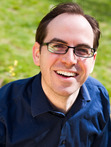Adam Szymkowicz's Blog, page 84
December 7, 2012
I Interview Playwrights Part 538: Saúl Enríquez
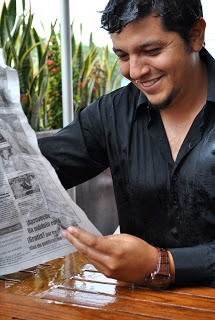
Translated by Andrea Thome and Lily Padilla
Saúl Enríquez
Hometown: I’m from Cardel, Veracruz, a beautiful town in the Gulf of Mexico, but I grew up in a magnificent valley in Orizaba, Veracruz.
Current City: Cancún, Quintana Roo, Mexico
Q: What are you working on now?
A: I’m creating a play about the reckless side of teenagers. It is part of a three play series on adolescence that I’m working on.
Q: Tell me, if you will, a story from your childhood that explains who you are as a writer or as a person.
A: I grew up in a place where people are used to creating stories; talking about legends that are constantly breaking down and being reconstructed. I remember one time when people swore they had found a werewolf on a mountain and that he had been captured by soldiers. I was a child, but to me the story seemed implausible. I was more fascinated by the fact that people believed this story than by the story itself.
Q: If you could change one thing about theater, what would it be?
A: The theater is a rare animal without rules…I like this.
Q: Who are or were your theatrical heroes?
A: I don’t know about heroes, but playwrights that I have always admired are Shakespeare, Racine, Moliere, Beckett, Chekhov, Strindberg, Mamet, Albee, Miller, Kane. And the Mexicans: Liera, Gonzales Dávila y Olguìn, Leñero, Berman. Directors and actors are another list.
Q: What kind of theater excites you?
A: All theater that creates a new universe and stays true to its own invented logic.
Q: What advice do you have for playwrights just starting out?
A: I am beginning. But I like to focus on substance over form.
Q: Plugs, please:
A: My theater company’s facebook page: https://www.facebook.com/pages/Nuncamerlot-Teatro/336899535544?fref=ts
Reading of Schnauzer Duck at the Lark in New York this Sunday at 3 translated by Mariana Carreño King and directed by May Adrales.







Published on December 07, 2012 06:54
Entrevisto a Dramaturgos: Saúl Enríquez
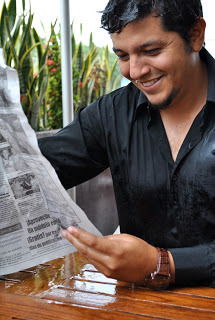
Saúl Enríquez
Procedencia: Soy de Cardel Veracruz, un pueblito hermoso del golfo de México, pero crecí en Orizaba Veracruz un valle magifico.
Ciudad Actual: Cancún, Quintana Roo, Mexico
¿En qué estás trabajando ahora?
Estoy construyendo una obra sobre el lado temerario de los adolescentes, pretendo escribir 3 obras sobre adolescentes.
Dime, si se quiere, una historia de su infancia que explica quién es usted como escritor o como persona.
Crecí en un sitio donde la gente tiene por costumbre crear historias, platicar leyendas que se están quebrando y construyendo todo el tiempo. Recuerdo una vez que, la gente juraba que habían encontrado un hombre lobo en una montaña y que lo había sido apresado por los soldados. Yo era un niño, pero la historia me parecía inverosimil, encontraba mas fascinación en que la gente creyera esta historia más que en la historia misma.
Si pudieras cambiar algo de teatro, ¿qué sería?
El teatro es un animal raro y sin reglas... eso me gusta
¿Quiénes son o fueron sus héroes de teatro?¿Qué tipo de teatro te excita?
No sé si héroes pero dramaturgos que siempre he admirado: Es Shakespeare, Racine. Molliere, Beckett, Chejov, Strindberg, Mamet, Albee, Miller, Kane... y mexicanos: Liera, Gonzales Dávila y Olguìn, Leñero, Berman. Directores y Actores esa es otra lista.
¿Qué tipo de teatro te excita?
Todo aquel que crea un universo nuevo y se sostiene sobre sus propias reglas.
¿Qué consejo le darías a los dramaturgos acaba de empezar?
Yo voy empezando. Pero me gusta ponderar en el fondo sobre la forma.
Plugs, Por Favor
La pagina de mi grupo: https://www.facebook.com/pages/Nuncamerlot-Teatro/336899535544?fref=ts







Published on December 07, 2012 06:40
December 6, 2012
Entrevisto a Dramaturgos: Bárbara Colio
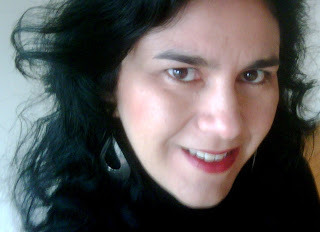
Bárbara Colio
Procedencia: Mexicali, Baja California, México.
Ciudad actual: Ciudad de México.
¿En qué estás trabajando ahora?:
Estoy trabajando con tres estupendos actores mexicanos, mi obra "vuelve cuando hayas ganado la guerra" ésta obra la terminé de escribir hace poco, pero esta vez, como no lo hacía desde hace varios años, la quiero dirigir yo misma, como una extensión de la escritura. Volver a meterme a la escena viva para aprender de ella. La estrenaremos en abril del 2013 en un espacio alternativo.
También estoy ansiosa por asistir al estreno de mi obra "Cuerdas" en Madrid, en febrero 2013, la misma obra que estoy trabajando en esta residencia con Lark Play Development Center.
Dime, si se quiere, una historia de su infancia que explica quién es usted como escritor o como persona.
Cuando era niña, cada domingo, mi papá me llevaba a lo que se llamaba "el bosque de la ciudad" en mi ciudad natal. Mientras yo me divertía en los juegos y con los animales del pequeño zoológico que había ahí, mi papá practicaba su hobby favorito: la fotografía. Tengo cientos de fotos mí, en ese bosque, de cada domingo. Mi favorita, una donde estoy con cara de susto, cargando a un pequeño tigre, que mi papá hizo que sacaran de su jaula, solo para que posara conmigo.
Si esa foto no existiera, yo hubiera olvidado que un día, abracé a un tigre.
Si pudieras cambiar algo de teatro, ¿qué sería?
En Mexico, que existieran más facilidades para producir teatro.
¿Qué tipo de teatro te excita?
El que no me da respuestas, sino que me deja pensando en más de una pregunta.
¿Qué consejo le darías a los dramaturgos acaba de empezar?
Que lean, que vean, que escuchen, que vivan, que se detengan un momento a contemplar lo excepcional.







Published on December 06, 2012 15:37
I Interview Playwrights Part 537: Bárbara Colio
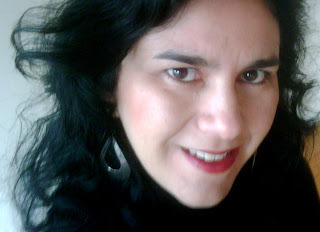
translated by Andrea Thome and Lily Padilla
Bárbara Colio
Hometown: Mexicali, Baja California, México.
Current Town: Mexico City
Q: What are you working on now?
A: I am working with three stupendous Mexican actors on my play “come back when you have won the war”. I recently finished writing it and this time, as I have not done in a many years, I am going to direct it myself as an extension of the writing. I’d like to immerse myself in the live, active scene to learn from it. The premiere is in April 2013 in an alternative space, a building in Mexico City’s historical center.
Also, I’m eager to attend the premiere of my play “Ropes” in Madrid in February 2013, the same play I’m working on in my residency at the Lark Play Development Center.
Q: Tell me, if you will, a story from your childhood that explains who you are as a writer or as a person.
A: When I was a little girl, every Sunday my father would take me to a park called “The City Forest” in my hometown. While I was playing on the playground and looking at zoo animals, my father practiced his favorite hobby: photography. I have hundreds of photos of myself; my favorite one is of me looking terrified, holding a baby tiger that my father asked the zookeepers to take out of his cage, only for the photograph.
If this photo didn’t exist, I would have forgotten that one day, I held a tiger.
Q: If you could change one thing about theater, what would it be?
A: That in Mexico, there would be more support for producing theater.
Q: What kind of theater excites you?
A: That which doesn’t give me answers, but which leaves me thinking about more than one question.
Q: What advice do you have for playwrights just starting out?
A: Read, observe, listen, live and pause a moment to contemplate the exceptional.
Q: Plugs?
A: Reading at the Lark of Ropes, translated by Maria Alexandria Beech and directed by Lou Moreno. Saturday at 7.







Published on December 06, 2012 15:32
I Interview Playwrights Part 536: Liza Birkenmeier
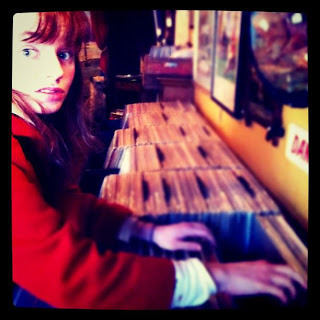
Liza Birkenmeier
Hometown: St. Louis, MO
Current Town: Brooklyn, NY
Q: What are you working on now?
A: I am working with collaborator-director-friend Katherine Brook on a piece that uses archival audio from interviews I recorded at a coffee house in Missouri. We are in the process of chopping up recordings of young transgender and queer people in the Midwest and gluing them to the structure of Arthur Miller’s ALL MY SONS. It follows a piece that we collaborated on called AMERICAN REALISM that used congressional archive recordings from the Dust Bowl. (We recently traveled with it to the San Diego Museum of art and LACE in Los Angeles). Also…I’m drafting some commissioned pieces—one is musical collaboration with Christopher Limber and Shakespeare Festival St. Louis, another is collaboration with Washington University and a large PR2 robot, and the third is a site-specific play that will premiere at a Laundromat next summer.
I'm also writing a play called INFIRMARY SHAKES about the Kentucky Narcotics Farm and the invention of gunpowder.
Q: Tell me, if you will, a story from your childhood that explains who you are as a writer or as a person.
A: I had an extremely blue time shortly before I turned twelve. I became spontaneously terrified of everything. In this painful, pre-pubescent era, I found incredible comfort in fantasizing that I was personally chosen as this planet’s primary liaison. Alien families were sent to me to learn about earth when they arrived. I would imagine taking them to my house, explaining the purpose of carpet, cooking them meals (they may never have seen food), telling them about how grass grew, showing them why humans had knees, and witnessing their first experience of hearing a song or drinking an orange soda. It made the world (even my small suburban-chain-link-fence- Wonderbread one) an incomprehensibly beautiful living museum, crammed with oddities and wonder.
Q: If you could change one thing about theater, what would it be?
A: Everyone, EVERYONE, everyone, all people from all places in all income brackets with all interests, would get really excited to see it. More excited than for scratch-off lotto tickets, Christmas, the Oscars, a PBR bucket special, low gas prices, or seeing a celebrity at the airport.
Q: Who are or were your theatrical heroes?
A: Some people who have changed/influenced my brain chemistry in the past couple of years: Rob Handel, Madeleine George, and the rest of 13P, Sid Vicious, Carter W. Lewis, Marisa Wegrzyn, RN Healey, Stefanie Zadravec, Will Eno, Lisa D’Amour, Gregory S Moss, Andy Warhol, Tennessee Williams, Katherine Brook, Daniel Fish, Karen O, Len Jenkin, Mac Wellman, Son House.
Q: What kind of theater excites you?
A: Many kinds. Quiet plays, epic plays, short plays, violent plays, operas, musicals, the circus, rodeos, elementary school holiday pageants, confrontational bathroom graffiti, rock concerts, intimate and public cell phone conversations, drunk arguments on the L train, debutante balls, family gatherings, laboratory experiments, sidewalk preaching, glass blowing…excite me very much.
Q: What advice do you have for playwrights just starting out?
A: I either AM or at least FEEL like a playwright just starting out…I will share this one thing I'm in the process of learning: The perfect, healthy day with no obligation or worry, with no “other work” or family need, with no sleepiness or social plans, with only the ideal, sunny room or quiet dark—isn’t really on its way. The plan to have spontaneous and concurrent freedom and genius is a myth. Write the entire play now, in the hour you have in the hotel lobby, in the two-hour plane ride, in your bed when you wake. Write it on the living room floor and finish it. Don’t let anyone read it until you are finished. Their criticisms/questions will be confusing or even insulting when they are guiding what the rest of the play will be. They will only make the “end” farther from you. Don’t rewrite th first act forty times before you start the second. Finish it. The ache that says tomorrow/next week/next month will be a better time is the fear that the end won’t be as “good” as your initial spark. It won’t be! It’s the inertia of work. It isn’t always going to be hayrides, petunias, and muses. Parts will suck. PARTS OF YOUR PLAY WILL SUCK, MAYBE TERRIBLY. Just write them down, regardless. Usually, after a first draft, I’m pretty sure my ENTIRE PLAY SUCKS TERRIBLY. This doesn’t have to be scary. Writing forward and deleting things can be acts that are not precious or spiritual. Truth/beauty/brilliance aren’t waiting in some corner/time you haven’t yet discovered. Allow your play to suck today instead of waiting for it to be perfect next winter. Most of the work will be repairing it, anyway. SO. Finish it now. Shaping it into the glory-genius-potential you once imagined won’t actually begin until it is written. Trusted voices can comment on the whole journey. Take notes, start again, do what you will to fill the gaps and sculpt the world/words. Today…finish the play.
Q: Plugs, please:
A: Look out for Katherine Brook’s LADY HAN in February at Incubator Arts. Stefanie Zadravec’s THE ELECTRIC BABY will be in Chicago and New Jersey in 2013. I’m excited to see I HATE FUCKING MEXICANS, now extended at The Flea.








Published on December 06, 2012 05:50
December 5, 2012
I Interview Playwrights Part 535: David Gaitán
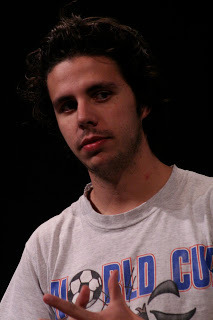
David Gaitán
Hometown: Mexico City
Current Town: Mexico City
Q: What are you working on now?
A: I'm writing a play for a specific group of actors; the peculiar thing (for me, at least) is that their average age is 75. I've always worked with people around my age... I’m writing a play based on the idea of randomness; I’ve seen this done on stage many times, but not often as an experiment that departs from the script itself.
Q: Tell me, if you will, a story from your childhood that explains who you are as a writer or as a person.
A: I was born with a deformity in my legs. I had two surgeries in order to correct this; later on, I used special shoes until I turned 6. During that time, my parents would make sure that my special shoes (up to the knees) were not seen (by me or the rest of the kids), so that nobody could identify me as handicapped. Along with this, I was encouraged to do everything... walk, run, jump, play soccer, dance... Eat the whole cake. Now, I work as an actor, playwright, and director. Many times, simultaneously.
Q: If you could change one thing about theater, what would it be?
A: I would make it for free. Always. And somehow manage to pay everybody in the play.
Q: Who are or were your theatrical heroes?
A: They've been changing lately.
I began with the obvious, classic ones: Shakespeare, etc.
Then it changed to my direct teachers.
Now, I don't know.
I would think that my heroes are my closest friends, those who are trying to understand theater in a different way.
Q: What kind of theater excites you?
A: That which that suggests a different way of doing things. Given that theater is a system in itself, I admire those who manipulate the system in order to create something new, to make the spectator's experience evolve.
Q: What advice do you have for playwrights just starting out?
A: Learn the technique.
Then, go against it.
But first, learn it.
Q: Plugs, please:
A: In New York, at The Lark, Saturday, December 8, a reading of Leakages and Anticoagulants, translated by Julián Mesri and directed by Mallory Catlett.
In Mexico City I will be acting in Disertaciones Sobre Un Charco, written by Edgar Chías, directed by David Jiménez. I will also be acting in El Camino del Insecto, which I wrote, also directed by David Jiménez. Both these plays are produced and performed by our company, Ocho Metros Cúbicos.







Published on December 05, 2012 20:22
I Interview Playwrights Part 534: Stephen Spotswood
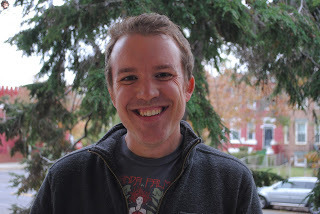
Stephen Spotswood
Hometown: North East, MD (it's not a compass point; it's the name of an actual town)
Current Town: Washington, D.C.
Q: What are you working on now?
A: I have a tendency to work on multiple projects at once so, in an effort to keep myself from rambling, I'm going to keep this to work I'm doing on the actual day I filled out this interview (Nov. 27th--happy birthday to me!). I spent the morning working on a short play for the HeyDay Players--a troupe of senior citizens who take classes at Round House Theatre's Education Center and tour readings of short plays to nearby nursing homes and senior centers. I've been lucky to write for them for three years now, and it's a joy to write for an age group that you rarely see on stage.
I'll be spending the first half of the afternoon at Woolly Mammoth Theatre recording a podcast play I was commissioned to write for the National New Play Network's Showcase which, in my timestream, is this coming weekend. I'm one of four D.C. playwrights commissioned by NNPN to craft short audio plays that people will listen to on iPods as they walk in one of four directions from the theatre. My play will be taking folks South to the National Mall. The Washington Monument? Best set piece ever.
And this evening, prior to celebrating my 35th, I'll be (hopefully) finishing the tweaks on new marketing art for WE TIRESIAS, which won Best Drama at the 2012 Capital Fringe, and is being remounted courtesy of Forum Theatre.
Then there will be drinking.
Q: Tell me, if you will, a story from your childhood that explains who you are as a writer or as a person.
A: When I was a kid I used to go to church with my parents on Sunday evening services. When it let out, I would run right to the car to turn on the radio, because on Sunday evenings 1210 AM ran recordings of old radio shows. So while my parents were talking with their friends in the church parking lot, I was sitting in a dark car, radio glowing, listening to stories of The Shadow, Jack Benny, The Green Hornet, The Outer Limits, etc. Does this explain me as a writer or a person? Not entirely. But a lot of my work is heavily narrative, with as much direct storytelling as dialogue. And the topic of religion and people coming to terms with/struggling against it comes up more times than I can count.
Q: If you could change one thing about theater, what would it be?
A: I would take everyone’s definition of theatre (even my own), throw it in an oil barrel, and set it on fire.
Q: Who are or were your theatrical heroes?
A: A lot of my theatrical heroes create work at that intersection of traditional theatre, music, performance, and storytelling. Amanda Palmer, Taylor Mac, Mike Daisey and Eric Ehn to name a few.
Q: What kind of theater excites you?
A: I love theatre that takes chances—where actors, writers, designers, whole companies are trying things they don’t know they’re capable of. Punching above their weight class, so to speak. I like to walk out of a show not wanting to ever write another word because I could never do something that brilliant. And then, a few hours later, wanting to outdo it.
Q: What advice do you have for playwrights just starting out?
A: See all the theatre you possibly can. Meet the people that make it—the actors, the directors, the designers, the other writers. Take them out for coffee or beer or wine or whiskey. Find out about them; tell them about yourself; see their work; show them yours if they ask. Write a play. Then write another one. Then write another one. And if you can’t find somebody to produce the first three, write a fourth and produce it yourself. Ask the other artists you’ve befriended to help. Invite everyone you know and everyone they know and as many strangers to come and see it. Then do it all over again. And if people like your work and like working with you, things begin to move of their own volition.
Q: Plugs, please:
A: WE TIRESIAS opens at Round House Silver Spring on January 3. It’s a story about the future and doomed love and old tragedies told from the point of view of a boy who becomes a woman who becomes the old, blind man destined to give Oedipus the bad news.







Published on December 05, 2012 06:51
December 1, 2012
I Interview Playwrights Part 533: Erica Saleh
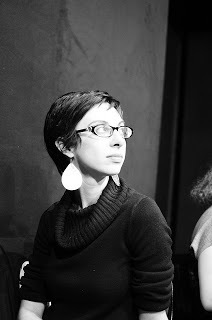
Erica Saleh
Hometown: Dryden, NY
Current Town: Brooklyn, NY
Q: What are you working on now?
A: I'm deep into rewrites on a play I wrote earlier this year, The Morning After, about a young woman who is, rather suddenly, forced to confront the ways in which her politics and theory and feminism do or do not line up with her personal desires and private life. It's also very concerned with the semantics of the word rape, Austin Texas, and pop culture.
I'm also just starting work on a commission from Dramatics Magazine to write a play for a large cast of high schoolers, which is fun and messy and a really good antidote to wrestling with revisions and incessantly thinking about feminism and rape.
Q: Tell me, if you will, a story from your childhood that explains who you are as a writer or as a person.
A: Ah. Ok. I usually claim that I wasn't really a theater kid, but then I remember this embarrassing story and wonder if I'm lying to myself about not having been a theater kid...
When I was in middle school my friends all suddenly revealed themselves to be really good athletes and decided that playing pick up basketball after school was a really fun thing to do. I, on the other hand, was scrawny and uncoordinated and thought playing basketball after school was significantly less fun than being in school. But I obviously played anyway, because that's what you do. One day the game wasn't going very well, I don't remember why or what that even means, I just remember everyone was frustrated. And one of the girls stopped and said "do you guys want to stop and make up plays?" And I got SO excited, and felt SO relieved, and blurted out "Yeah! Or like, dances or something?!" and everyone stared at me and I quickly realized that she had meant basketball plays, not play plays. And it was the kind of embarrassing moment that just sort of burns into your being because you've accidentally revealed yourself? The kind that you think about for months afterward and feel ashamed? And then don't think about for years because you were so embarrassed and then 17 years later remember and realize it's not actually embarrassing at all but a confirmation of the person you've become.
Q: If you could change one thing about theater, what would it be?
A: I would shift the dialogue between theatermakers to one of positivity. It is so easy to talk about what we don't like. It is so easy to say that things are unfair. And that's not wrong. There is inequity, there is unfairness, and it is, of course, worth talking about constructively and working to change. But there is also so much to be celebrated. There is so much that is exciting and fortunate and good about what we do. There is so much good theater being made. I would challenge all of us to talk about that. To go into plays with an open heart and and optimistic mind and look for things to admire and respect rather than things to criticize. I would challenge all of us to realize that we have picked a life that is difficult, but also a life that is awesome, and to remind ourselves and each other of why we do it. To call out the magic when we see it. And if we don't see it enough, to actively look for it, because it's there.
Q: Who are or were your theatrical heroes?
A: Caryl Churchill. Sara Kane. Gina Gionfriddo. Tennessee Williams. And all of my former teachers, but I want to specifically call out Daniel Alexander Jones for his beautiful work but also for his generous spirit and inspirational relationship with his art and community; and Sherry Kramer for her wonderful work but also for her humor and honesty and kindness. These two taught me not only how to be a better playwright but how to be a better person and community member.
Q: What kind of theater excites you?
A: Something that excites me about theater that excites me is that the only pattern I can find is that it excites me. Plays that have knocked me over in the past few years have been wildly different form one another. Some of these, in no particular order, were: Becky Shaw, Banana Bag and Bodice's Beowulf, Hand to God, Circle Mirror Transformation, The Select(The Sun Also Rises), The Whale, Milk Milk Lemonade, Rapture Blister Burn... I could keep going and going, see above about how there is SO much good theater being made. But the point is that these plays are all really really different form each other. That said, I think, the common thread that triggers the excitement for me, is that they are all honest, and in that honesty they are simultaneously heartbreaking and hopeful. So I guess the short answer to what excites me is theater that breaks my heart but leaves me hopeful.
Q: What advice do you have for playwrights just starting out?
A: Be kind to yourself. Be honest in your work. Be generous to your community.
Q: Plugs, please:
A: Three Graces will be hosting reading of my play The Morning After at The Gin Mill on January 22nd, and I have a play in an evening of short plays written for teenagers (and written by a whole slew of awesome playwrights) at the 52nd street project in early February.








Published on December 01, 2012 08:11
November 30, 2012
I Interview Playwrights Part 532: Mira Gibson
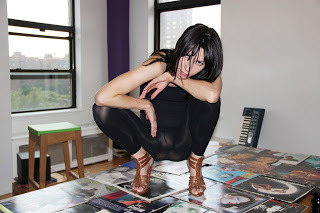
Photo credit: Benjamin Kosman
Mira Gibson
Hometown: Sanbornton, NH
Current Town: Brooklyn, NY
Q: What are you working on now?
A: At the moment I have a few scripts in the works that were inspired by my sex industry work as a foot fetish dominatrix. FATHERFUCKER, my latest play, is about a young woman desperate for fast cash. She is presented with an opportunity to be a “foot fetish model”. On her first day of work, she expects to show up at a club and have her work supervised by a bouncer. Instead, she arrives at a private residential studio apartment in the East Village where a 22 Korean-American student struggles through an English explanation of “always keeping a sharp object nearby” and “no foot-jobs”. There is no bouncer or protection of any kind, and she is left alone to navigate through the dark and often humorous underbelly of this very strange and psychological fetish. The play also endeavors to coin the phrase “father fucker”. We all have an understanding of what a “mother fucker” is. A mother fucker is a man who will likely rape your wife in front of you and kill your kids with no mercy, but what is a father fucker? I’m drawn to this concept in large part because I was a father fucker, literally, not by choice, but through childhood abuse, and because of that I destroy myself and others in very specific ways when I’m less within my own control. In my play, I’m exploring the definition of “father fucker” through the journey of my protagonist. And the beauty of this play is that I’m an authority on foot fetishism, I lived it, and though I got out, I’m still deeply fascinated. I’m writing this topic as a screenplay and TV show as well….yes, TV show…not my idea by the way, but I was encouraged so what the hell?
Q: Tell me, if you will, a story from your childhood that explains who you are as a writer or as a person.
A: It’s no secret that I was sexually abused by my dad from about 5 years old to age 13. My dad is a textbook pedophile and is currently in prison for the abuse he inflicted on me and my twin sister. This trauma is absolutely the source of nearly 90% of my writing, especially since I often write about myself and the very tangled and specific mess I am left with. What am I supposed to do with all this? Writing helps me figure it out. And I feel extremely lucky that I have the courage to stand here and reveal myself. I give a voice to a lot of people who have had the same experience as me. Something astounding, which I think about often, is that every single time, every single time without fail that I’ve had a play reading, or production, or screening of my movie WARFIELD, at least one person from the audience has approached me afterwards to share that that happened to them to. I try not to write bleak stories, however. So even though I write on this topic, often the soul of the story is about the hope and willingness to change, improve, and evolve into our best selves. I always wanted my dad to be a great father, and you know what, he did too. And as a kid I honestly saw him try, but he always failed. In my writing I give my dad a chance to succeed, and be the person I always deeply hoped he would be.
Q: If you could change one thing about theater, what would it be?
A: Only two things: most importantly I would change the number of people it reaches. Theater, by the very art form that it is, is incredibly limited in the number of people that can see it, just from a geographical standpoint. I’ve actually have been getting into writing movies in large part because it can reach more people. The second I would change is its cost. I cannot tell you how much theater I opt not to see because it’s too costly. And then I have my dear friends who mention that with certain programs I can see a play for $35, sorry but that’s too much for me. I should mention, however, that I’m perpetually on the brink of extinction financially.
Q: Who are or were your theatrical heroes?
A: The reason I write plays, and not books or poems or short werewolf novellas (which was my childhood dream by the way) is because a friend of my mothers handed me Tennessee Williams’ Summer and Smoke the summer before I went to college. Reading that play stirred something in me that compelled me to focus on playwriting from that moment on. So I give huge credit to Williams. Another hero of mine is Paula Vogel, whose work I was introduced to in college. Reading How I Learned To Drive was a pivotal point for me because it showed me you can reveal yourself and it just might make you a better writer. Other heroes of mine are actually playwright peers and friends whose plays and even personalities inspire me on a daily basis. In lieu of listing them here, just check out anyone who’s ever been in Youngblood.
Q: What kind of theater excites you?
A: Dirty downtown theater, baby!
Q: What advice do you have for playwrights just starting out?
A: To keep writing. You want to write because you have something to say and that’s no accident. If people didn’t need to hear it, you wouldn’t want to say it. What you’re doing is important. And never, for one second, believe that rejection is an indication that what you’re writing doesn’t matter. It matters, and you matter.
Q: Plugs, please:
A: Please check out my feature film, WARFIELD which was the pilot project of my new theater and film production company, Summer Smoke Productions (yes, named after the Tennessee Williams play) http://summersmokeproductions.squarespace.com/ In addition to screening at film festivals, I’ve started an initiative to distribute to prisons, registered sex offender rehabilitation programs, and to organizations that council survivors of sexual abuse and domestic violence.







Published on November 30, 2012 09:23
November 29, 2012
I Interview Playwrights Part 531: E. J. C. Calvert
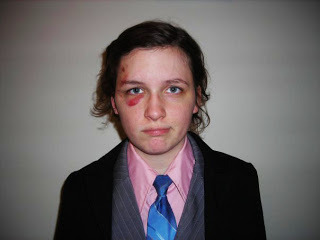
E. J. C. Calvert
Hometown: I was born in St. Louis, MO, and lived there long enough to form a couple foggy memories. Then I grew up primarily in Rochester, NY, with stints in Palo Alto and Pittsburgh, before returning to St. Louis for some of high school and undergrad. So... St. Louis, I guess, because that’s where I started drinking beer.
Current Town: Chicago, Il. Come visit me, we’ll get tacos.
Q: What are you working on now?
A: I’m currently writing for the upcoming web series Annie & Brie. It follows two women trying to survive their intermediate acting class, trying to navigate the city, and trying to be friends and roommates without throttling each other. It’s going to be a raucous good time; I’ve had a huge amount of fun writing these episodes.
Q: Tell me, if you will, a story from your childhood that explains who you are as a writer or as a person.
A: So, I don’t want to say I was a bossy kid. It’s just that I’m the oldest of three siblings, and somebody needed to keep everyone on their marks and make sure they knew their lines by the time our parents and their friends finished their wine and were ready to leave. “Time for Brian and Danny to go home,” our parents call down to the basement.” I could hear the adults gathering car keys and putting on their coats. “WAIT!” Little Auteur Calvert shouts up the stairs, “Come downstairs, we have a play for you!”
I wonder if they had been bracing themselves for this announcement. It is commendable that I have no memory of hearing them groan as they came down the basement stairs to take their places in the row of child-size chairs I set out.
Our stage was an old mattress with a door laying on it, which gave our productions an air of seasickness. The exhausted adults perched uncomfortably, trying not to yawn too frequently as they watched their children pitch across the unsteady stage, reciting pun after impeccably-drilled pun.
So maybe I didn’t get the hint when my mom was flashing repeated “wrap-it-up” gestures. I promise that, since then, I’ve gotten better at receiving criticism. Plus, now I understand the joy of letting your audience drink their wine while they’re in their uncomfortable, child-size seats, instead of expecting them to finish drinking pre-show.
Q: If you could change one thing about theater, what would it be?
A: It always comes down to money, doesn’t it? Theater folks do amazing things on shoestring budgets, but even with all our thrifty ingenuity, ticket prices can make shows inaccessible to potential audiences. Okay, everybody, one, two, three: group frown!
Q: Who are or were your theatrical heroes?
A: 13P and Alfred Jarry.
Q: What kind of theater excites you?
A: I’m a big fan of nudity, violence, jokes and swears. I’m still on the fence about puns, though, and I have a uncontrollable eye-roll complex when it comes to extended scientific metaphors. I enjoy site-specific theater and theater in non-traditional spaces. I’ve gone to shows solely because critics panned them for being too pretentious, which probably says something unpleasant about me.
Q: What advice do you have for playwrights just starting out?
A: Three things, in list form:
1. Produce your own work. This will be hard and terrible, but that play isn’t doing you any good sitting on your hard drive. If your play isn’t on its feet, it’s just an improperly formatted, dialogue-heavy novel that no one will ever read.
2. Whatever you do, write something you want to see. Then you can skip circles around sneering talk-back audiences, sing-songing “There’s no accounting for taste!” (Maybe don’t do that, though, nobody likes an asshole.)
3. Don’t read any of these lists, it’ll give you a complex.
Q: Plugs, please:
A: I’m half of comedy-duo Lizanda, and we’re gearing up to perform the first NYC production of #1 Besties with Boy Trouble, a semi-scripted hour-long comedy that premiered at Chicago Fringe Festival this summer. We’ll be at The Creek and the Cave this Friday at 8 p.m.
Annie & Brie will be premiering in Spring 2013. facebook.com/annieandbrie







Published on November 29, 2012 06:50

